#yuurakutei yakumo
Explore tagged Tumblr posts
Text
Just finished Shouwa Genroku Rakugo Shinjuu and I'm not fine 🥲🥲🥲
Ishida san literally aged through his role as Yakudaddy










His final shinigami performance gave me goosebumps
Loved the fact that they didn't just leave us hanging and put in effort to tie up all the loose threads for a proper and satisfying ending
9 notes
·
View notes
Text

obsessed with one sad old man
#finished watching season 2 yesterday and I Am Going Through It#brain is on fire#kikuhiko#yakumo yuurakutei#showa genroku rakugo shinju#shouwa genroku rakugo shinjuu#my art
5 notes
·
View notes
Note
Love to see your fav characters' list...Do you know that the mangaka of Shouwa Genroku also wrote a few BL manga series? One of them is my all time BL fav, called : My Darling Kitten Hair (Itoshi no Nekokke)....Sorry if you already know and don't like the manga.
Hi anon,
I feel kind of bad writing this but like dsalkfjdsa yeah I did know that because I kind of literally said it in the paragraph where I say he's one of my favourite characters:
Yuurakutei Yakumo (Kikuhiku) from Shouwa Genroku Rakugo Shinjuu - I just… *flails* Almost no one has seen this anime series and it kind of kills me because firstly the books were written by someone practiced in writing BL and even though this isn’t BL you can still tell the vibes are there. Secondly, one of the most ace-coded characters ever. Gender-fuckery abounds, which is fun. Thirdly just, honestly, more folks should watch this?
I'm just going to assume you were super excited because you saw the anime / character ref and didn't read the rest of the paragraph which is something I think we've all done once or twice (or a lot!)
I mostly like Rakugo/Descending Stories because of the historical research that went into it, and because the Yakumo + Sukeroku vibes remind me of two of my own characters, Augus + Ash. So I don't need it to be BL! I know I've read Itoshi no Nekkoke but I don't remember it skadfjasd (which is normal for me! I forget so much of what I read which makes re-reading a lot of fun :D )
#asks and answers#inadvertent recs#i'm sorry anon don't feel bad fsdklafsja this is like#something that happens to all of us#but yeah i definitely love that like this got made#based off series by a BL writer even though this series / manga isn't BL#i just like that the vibes are coming from somewhere 'real' instead of somewhere fanservicey#not that i'm against fanservice#idk i just like it#it gives the show a really nice chemistry
12 notes
·
View notes
Text

HAPPY BIRTHDAY TO ISHIDA AKIRA! [11.02]
Yet another one of my favourite seiyuus. I definitely did not know he portrayed Xerxes Break since I watched the series a long time ago and I was not yet interested in seiyuus. He did a magnificent job in Shouwa Genroku Rakugo Shinjuu [imo] as Yuurakutei Yakumo. Watching that series made him one of my top favourites. And let's not forget Fyodor Dostoyevsky of BSD! He did a great job portraying that role. Watching Fyodor and Dazai reminded me of Akaza and Douma because they have the same seiyuus and they are besties! LOL
9 notes
·
View notes
Note
look i got here from one of you doji danshi fics (great stuff, A+) but then i saw '#yuurakutei yakumo the eighth…… #bon my beloved :')' in your tags and now i'm obliged to ask for your hand in marriage, actually (if you got this ask more than once i'm so sorry, tumblr is tumblring)
omg let's hold hands and frolic through the field called amazing taste <3
i'm usually the worst at choosing/ranking my favorite anything but descending stories is easily my favorite anime of all time, i truly think it's a masterclass in storytelling and bon is the old man of all time
genuinely everyone please watch descending stories it is the most beautiful the most devastating the most i want to eat it with my teeth story in existence
#asks#THANK YOU FOR THE ASK I LOVE TALKING ABOUT RAKUGO ANIME I'LL ALWAYS TALK ABOUT RAKUGO ANIME I NEVER TALK ABOUT RAKUGO ANIME LMAO#almost no one ever talks about rakugo anime :')#though in a way that may be for the best because when i think about it for too long i start to feel unwell lol (positive)#maybe... maybe it is time for a rewatch......
5 notes
·
View notes
Text
imagine getting banned from social media for saying what yotarou did to yuurakutei yakumo the eighth
9 notes
·
View notes
Text

happy birthday to this mon gaku I spotted at AX
and shoutout to the yakumo yuurakutei the 8th itabag (ty @adzuki-ren and @vulpiximisa for helping identify)
#if you are the owner of this mon and would like this post removed please lmk!#and if you wanna be friends pls lmk too!!#also if you were at the i7 meetup at AX and I didn’t come talk to you then I’m sorry t__t#idolish7#i7#mine
2 notes
·
View notes
Text


um.. one taught me i am trans the other taught me... that i'm writing a rakugo dissertation??
0 notes
Photo

I wanted to draw him from the Epilogue ;q; I miss you
197 notes
·
View notes
Photo










get to know me // anime ver.
[4/5] male characters - eighth generation yuurakutei yakumo | kikuhiko
#shouwa genroku rakugo shinjuu#kikuhiko#dailyanime#fymanganime#fyanimegifs#kiku#yuurakutei yakumo#sgrs edit#sgrs#yakumo yurakuetei#my edit#op#this was the most miserable gif making experience i've ever had#i was just so emo for kiku the whole time#enjoy this sad old man#cw: blood#gtkm meme
309 notes
·
View notes
Photo

yotayaku,have reference template,master and his student are the best!
19 notes
·
View notes
Text
More SGRS EXTRAS Guys.
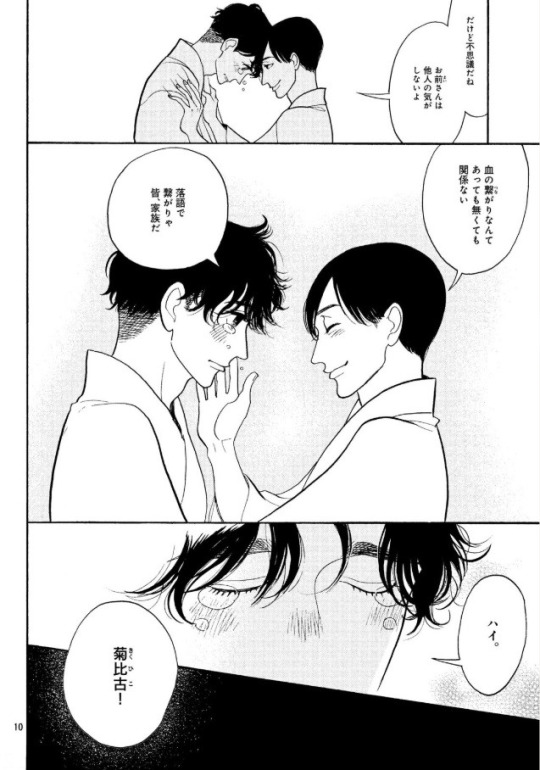
Real precious grandson and grandfather reunion moment here.
#shouwa genroku rakugo shinjuu#showa genroku rakugo shinju#shinnosuke#yuurakutei yakumo#Yakumo Yurakutei#kikuhiko#haruko kumota#kumoto haruko#manga series#manga scan#manga#sgrs#sgrs spoilers#manga caps#manga related
131 notes
·
View notes
Photo
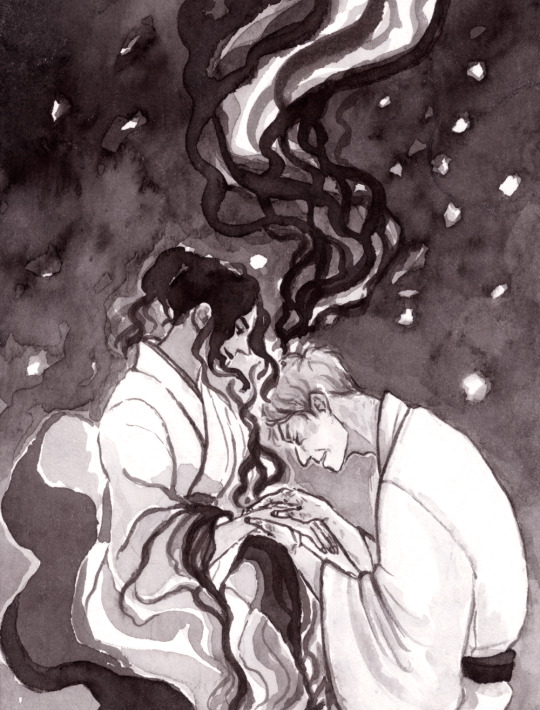
and at your final end when you are free again no longer long to be you will belong to me your ghost, oh, your ghost
#shouwa genroku rakugo shinjuu#kumota haruko#yuurakutei yakumo#miyokichi#inktober#inktober 2020#ink#your ghost#the decemberists#i'm in pain
262 notes
·
View notes
Text
Thinking of anime - Descending Stories: Showa Genroku Rakugo Shinjuu by Haruko Kumota Part 2
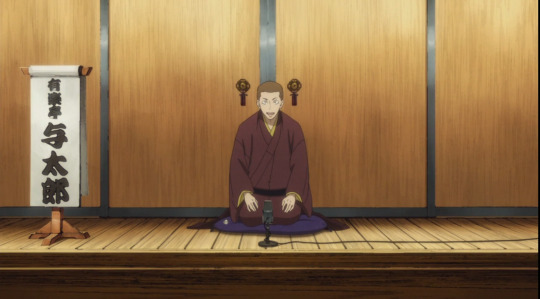
The first disciple of Yakumo, Yotaro. Often in Rakugo, the foolish characters are named Yotaro
In part 1, I gave you a general introduction of the series Showa Genroku Rakugo Shinjuu (SGRS). From here on, I shan’t explain in-depth the story and the characters as my intent here are not in recommending this anime. People who watch it will watch it and those who will fall in love with this story will share what they love. And it is this love that binds the community as a whole.
I want to start off by having some working definitions of technical words that will be used.
Let’s start off with culture. We use this word often in our daily lives and it is strongly ingrained in our vocabulary; it is something we know the meaning of, but not many can give the definition to. This tends to happen as culture is used as an umbrella term to encompass social behavior, norms, knowledge, beliefs, objects, and so on of a group of individuals. It is something that is fluid and changes over time.
Cultural practices are performed largely to arrange the social relations and relations of production in a certain way. This method of arrangement can be of necessity or arbitrary and can be fluid but also cemented with something more solid then culture. When cultural practices are cemented it becomes comparatively unaffected and can resist changes brought on by the fluidity of culture around; becoming traditional practices. Often those practices lose meaning that was attached to it during this transition and it becomes a free ground for meaning to be created by its practitioners, and audiences.
Performativity is a term that many will be familiar with through Judith Butler’s use of the term gender performativity. But I’ll use it here in the context of traditional practices; cultural performativity; that it is through the repeated performance that such practices, even after losing its function of social organization can it survive; it is the continued practice that results in the tradition being kept alive, rather the tradition dictating the actions that are performed.
Framing tradition as something that is kept alive by repeated performance rather than a monolithic set of rules, allows us to find ways to alter it as the culture around it changes; co-existing with progress. There is a view in our world today that dims tradition as harmful to progress. There is also an opposite spectrum of this view that tries to use traditional value as a device to create us vs them divide and a different way of seeing tradition may help us preserve the meaning people attach to it, while it serves to better, not jeopardize our society.
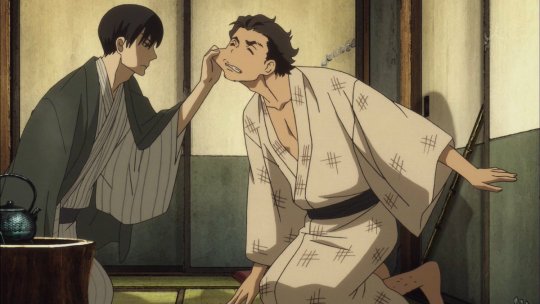
The two brother disciples, platonic but also loving relationship
Let’s recap what is my belief that the author wants to convey to us which are: What does it mean to hold affection? And how does affection of the past influence our interaction with the world that changes?
The whole of season 1, except for the very first episode, depicts the life of Yakumo (or Bong at this point) in his earlier days. It starts with an introduction of him when he was seven years old and sent off to study Rakugo under the then seventh-generation Yakumo. On his first day as a disciple, he meets Sukeroku, who becomes his brother by discipleship. During their interaction, we learn of how Bong felt abandoned by his parents who sent him off to Yakumo as they did not want him as their son.
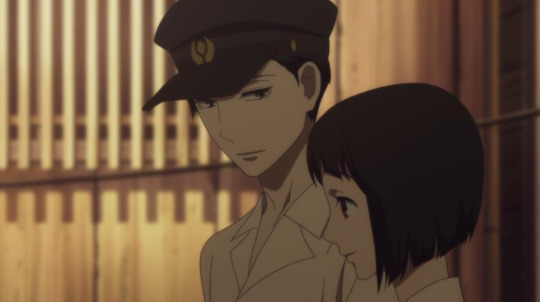
Bong in his first romantic relationship
We then skip forward a few years to his teenage years, Bong, due to the fear of being abandoned again, desperately holds onto Rakugo, hoping that if he were to get good enough, it would become a place where he could belong. This becomes an obsession and he becomes blind to other places to belong; where he can find solace. Namely, this is shown as a girl that he meets and falls in love with, yet due to Bong’s obsession with his practice, they drift apart.
After graduating from mandatory education, Bong receives the name of Kiku and along with Sukeroku, begins to perform properly on stage as a full-time Rakugoka. During this period, Kiku puts in great effort into his practice yet always lacks behind Sukeroku. Yet Sukuroku’s free nature prevents him from adhering to the restrictive rules of tradition and this makes him disliked by the elder members of the practice.
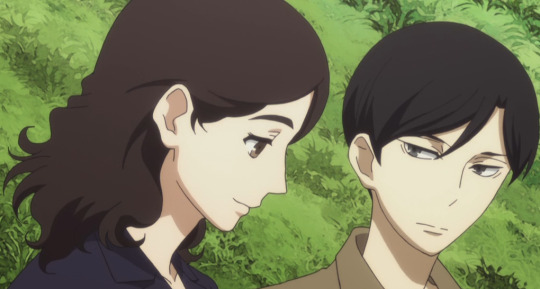
The last chance for a simpler life
Japan soon becomes embroiled in various wars and this led to a period of restraint; a period where people avoid wasting resources so that it can be directed towards the war, this has a direct impact on entertainment industries, and Rakugo as well. As time passes and the war continues, Kikuhoko’s teacher and Sukeroku travel to Manchuria to perform for the soldiers on the front lines while Kiku is unable to follow them due to the problem of his leg.
During this period, he moves to the countryside and works in a factory, this slow life allowing him to contemplate if he should just stay there and not return to the busy city to practice Rakugo. Here, he had a chance to find another way of life, free from his obsession with Rakugo, and try to find meaning in something else.
The war eventually ends, and he returns to Tokyo. As society begins to recover from the damages of war, people begin to seek out entertainments and Kiku returns to practicing Rakugo to earn a living. Eventually, his teacher and Sukeroku make it back to Japan and everyone is happy and reunited.

Miyokichi flirts with Kikuhiko, but Kiku is not sure
Here we are introduced to Miyokichi and she quickly takes a liking of Kiku, falling in love with him. This time Kiku does reciprocates, even if his priority is always with practicing Rakugo, and for a while, Miyokichi is okay with this, she is happy seeing the person she loves happy and knows what it is that they want to achieve in life.

Different camera works are employeed to show the different
While Kiku was devoted to his practice, Sukeroku’s disdain for tradition grows. In the words of the characters, the two are compared in their way of performance. For Kiku, he embodies the characters and brings the audiences into the world that is being told; he is fluid in his selfhood when performing and tells the story as it is, as close as possible to its intention. Sukeroku is the opposite. All the characters become Sukeroku as he tells the story. He follows the general structure, but his method of delivery is unique to himself and how he feels at that moment; he is unstable but his leads to uniqueness in his telling of the story. If people watch Kiku to listen to the stories he tells, they watch Sukeroku to enjoy Sukeroku’s performance.
The audience loves them for their individual styles, but Sukeroku’s style makes him shine out compared to the older generations and this results in him increasingly losing favor from the senior practitioners. Yet he was kept around since the audiences liked him, but as his fame increased so did his ego. This eventually results in him being excommunicated from his teacher.
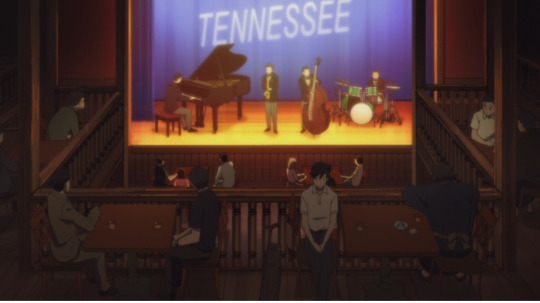
Westernisation of entertainment in Japan, post-pacific war
And yet if we were to see his actions from a different perspective, we can see this as another form of struggle to keep the practice of Rakugo alive. At this point in history (and depicted in the series), Japan had been experiencing westernization of culture. Kiku works in a café, there is a jazz bar, and Rakugo has been losing its audience as time went by.
The two characters, Sukeroku and Kiku were the youngest practitioners; at least among those, we are introduced to. Thus the two promise each other to continue the practice, to keep it alive, and attempt to revitalize it. To them, Kiku who told the stories as they were would symbolize the tradition that has continued down for centuries, While Sukeroku would symbolize the constant change that is needed for the continued existence of the culture; thus they are not lost to the tide of time; they make a promise to both work together and keep the practice they love alive.
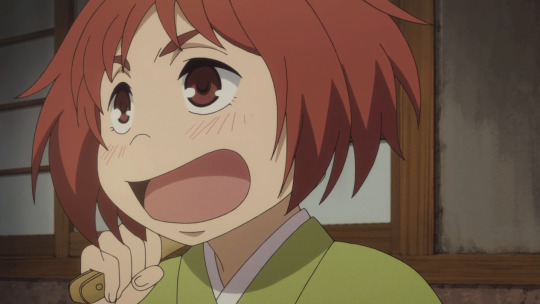
Konatsu. The daughter of Miyokichi and Sukeroku. She shows us just how many years passed since they ranaway
Yet this promise is left unkept. After Sukeroku’s excommunication, and Kiku’s rejection of Miyokichi’s advances, the two run away from the city to the countryside, have a child and start a family together. However, due to her rejection by Kiku, Miyokichi prevents Sukeroku from practicing Rakugo, as he did not have any other skills, he was unable to earn a living and became a drunk. Fed up with this, she runs away, leaving him and their daughter Konatsu. This belief becomes an obsession and she becomes delusional that Kikuhiko will one day come to save her from this misery.
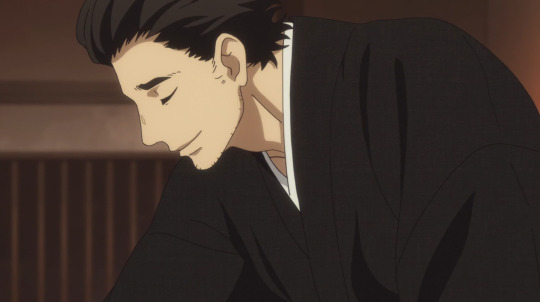
Sukeroku: “No, I won’t drink this Sake. I don’t want this to have been just a dream”
While this was happening, Kiku became better accepted by the senior members of the practice and built up enough fame to the point that there were people who wanted to be his disciple. However, to Kiku, Rakugo that has now lost Sukeroku to guide it to the future is only left to wither away and die. The more he believed this, the more convinced he was that his role was to see it off to the end.
Yet he holds out hope that if he was just able to bring Sukeroku back, things might change. And after his teacher’s passing, he journeys out in search of him. He finds him eventually, and with effort was able to bring Sukeroku out of his drinking habit and bring him back to performing Rakugo, first at the nearby inn. The performance was successful and for a moment we see the possibility for their promise being kept. Sukeroku wants to go back to the city with Kiku, and start performing Rakugo again as a profession, the reason, not the least of which, the love his daughter shows for his performance.
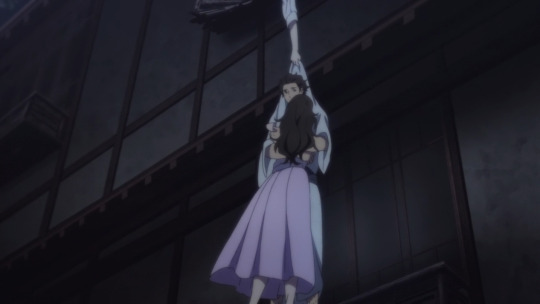
Did this really happen?
Yet all goes astray when Miyokichi returns that exact night for Kiku and her obsession with him results in her attempt to commit double suicide with him. Sukeroku saves Kikuhiko in the end but ends up falling off the balcony and into the river below, this taking away his and Miyokichi’s life.
His final words being “I trust you”.
What was he trusting Kiku with?
To take care of Konatsu?
To take care of Rakugo?
Or to take care of himself?
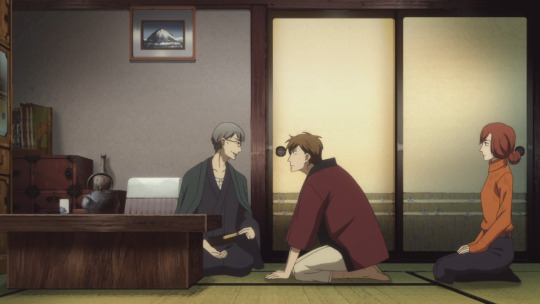
Our unreliable narrator begins to tell his story
Of course, we are later told that Kiku, or after this point Yakumo is an unreliable narrator, ironic, being that the person who is described in the series as the best storyteller being unreliable to us.
There is one more concept we need to understand and use in understanding how to make tradition evolve and live on, and that is Repetition and difference from Gilles Deleuze; when used together with Butler’s performativity, it can help us greatly in this journey of understanding.
That will be our focus in the next chapter.
But to end this chapter, let us end it off with this consideration. With Sukeroku’s death, Yakumo completely lost his faith in Rakugo having a future. This leads to him both refusing to take any disciple, and also prevent Konatsu from trying to practice it. This obsession also leads to him being convinced that it was his destiny to witness the death of this practice, thus the title, to commit double suicide with Rakugo during the age of Showa Genroku.
Role credits
#Anime analysis#showa genroku rakugo shinju#yuurakutei yakumo#yuurakutei sukeroku#sgrs#Sukeroku Yuurakutei#Yakumo Yuurakutei
25 notes
·
View notes
Photo

Shouwa Genroku Rakugo Shinjuu - Yuurakutei, Yakumo
#anime#shouwa genroku rakugo shinjuu#monochrome#black and white#yuurakutei yakumo#rakugo#snow#yuki#artsmonogifs
59 notes
·
View notes
